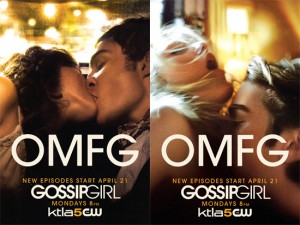In 1936 Ernest Hemingway published “The Snows of Kilimanjaro,” in which a dying novelist remembered an old friend:
The rich were dull and they drank too much, or they played too much backgammon. They were dull and they were repetitious. He remembered poor Scott Fitzgerald and his romantic awe of them and how he had started a story once that began, “The very rich are different from you and me.” And how someone had said to Scott, Yes, they have more money. But that was not humorous to Scott. He thought they were a special glamorous race and when he found they weren’t it wrecked him just as much as any other thing had wrecked him.
When Fitzgerald read the story he wrote Hemingway in protest. In later printings of the story “Scott Fitzgerald” became “Julian.”
Gossip Girl premiered on September 19th, 2007 amidst great fanfare (New York Magazine, home to the most thorough database of GG on the web, titled their first episode recap: ‘Gossip Girl’: The Most Important Show of Our Time). Last week the show aired its 97th episode. I have seen, after first dipping in about two months ago, close to one third of the series, and I can confidently say that this is not, by most rational standards, a good show. However, I also feel pretty confident in agreeing with NYMag and their assessment that Gossip Girl, if not the most important show of our time, is probably the most important show on television right now.
It’s not important because of the characters, or their personalities: they are all rich, or smart, or good-looking – there’s a blonde and a brunette and a writer and a bad-boy. They all sleep with each other, they do drugs, they drink, they buy nice things and live in nice places; this is a cardboard world filled with cardboard characters, molded not with the intention to scrape reality but rather to flirt with fantasy. The show is, to a degree, aware of this: each episode is narrated by ‘Gossip Girl’, a voice that we never see attached to a blog that exists only to comment on the movements and machinations of the main characters. The audience is, like in all television, clearly voyeuristic, but the catch here is that we are also implied within the narrative: we are the loyal subjects to these young gods. And that’s what makes it interesting.
Sometimes our desires are more telling than our actions: what we wish to become is just as much a part of who we are as who we actually end up becoming. The American Dream, circa 2011, is not a white-picket fence, two kids, and a 401(k) – the American Dream of our generation is fame, money, power, sex and drugs and rock n’ roll: a line of cocaine off of a stripper’s leg, a good fuck in the pantry with the pool boy, tanned and chiseled. That these things are not practical or, for the most part, even possible, does not keep us from wanting them any less, it just keeps us from talking about it. So we watch TV, not to be enlightened or even entertained, but to both stoke and shackle our feverish dreams of America.
“Gatsby believed in the green light, the orgiastic future that year by year recedes before us.” And so did F. Scott; the green light at the end of the dock, the orgiastic future that they both gazed longingly upon might as well have been a television, set to an Gossip Girl on an endless loop. Hemingway, writing about F. Scott, got it mostly right except for this: what wrecked Fitzgerald was not that the rich turned out to be less glamorous than he had imagined, but that they turned out to be exactly the same as he was — making escape impossible.
This post may contain affiliate links.









